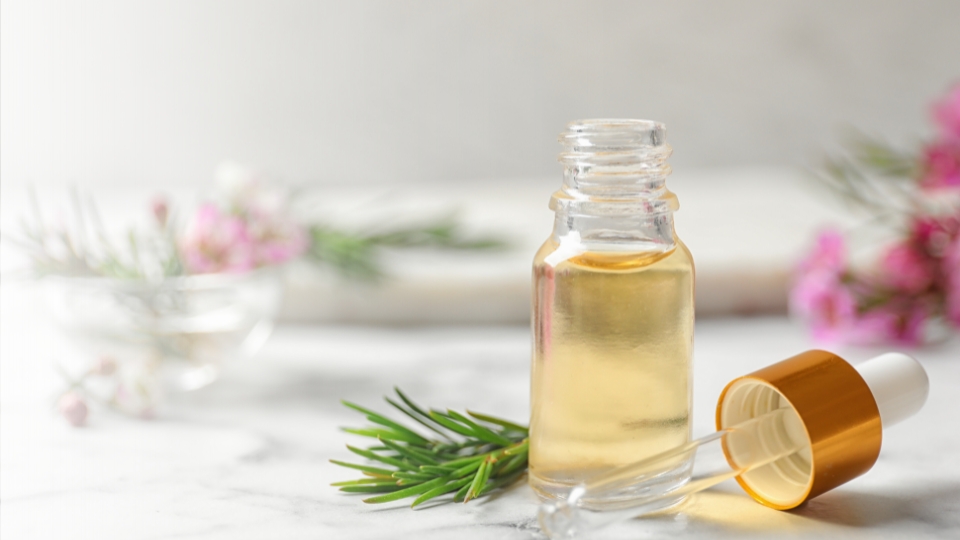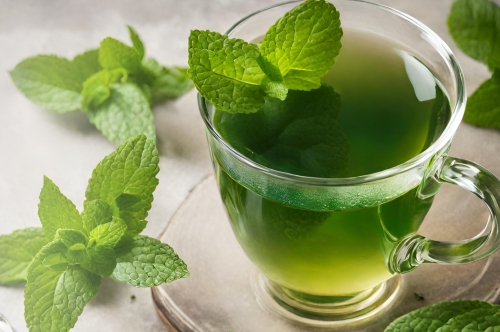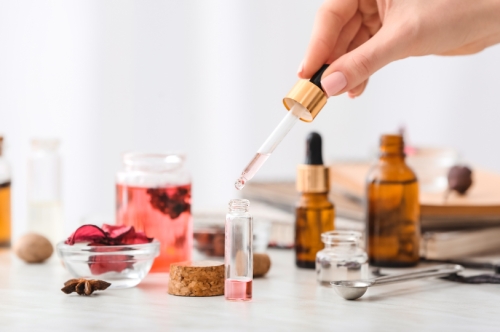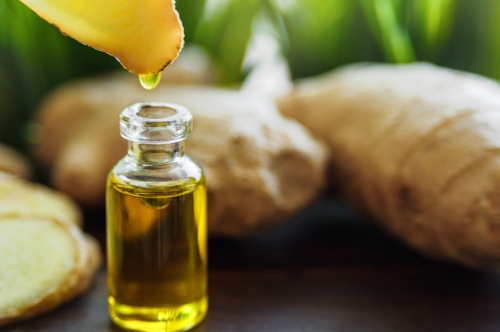Powerful Uses of Tea Tree Oil | A Natural Remedy for Skin & Hair

Tea Tree Oil: A Versatile Essential Oil
Tea Tree Oil, derived from the leaves of the Melaleuca alternifolia plant, is a versatile essential oil renowned for its diverse applications. Its natural antibacterial, antifungal, and anti-inflammatory properties make it a valuable addition to skincare and haircare routines. Tea Tree Oil effectively addresses acne, minor cuts, and skin irritations, mitigating bacteria and reducing redness. It also aids in treating dandruff and promoting a healthy scalp.
With its distinctive medicinal scent, Tea Tree Oil is a potent natural remedy for respiratory issues when used in steam inhalation. It has been employed for generations by indigenous Australians for its healing benefits. Additionally, the oil's antimicrobial qualities extend to household cleaning, offering an eco-friendly alternative to chemical-laden products.
Caution should be exercised, as Tea Tree Oil can cause skin irritation when undiluted, especially for sensitive skin. As with any essential oil, a patch test is advisable before widespread application. In summary, Tea Tree Oil's versatility as a skincare aid, scalp treatment, respiratory support, and household cleaner underscores its status as a fundamental and multifaceted essential oil.
Buy Tea Tree Oil here
Overview
Tea Tree Oil finds widespread use in various applications. This essential oil has gained popularity for its efficacy in skincare, where it addresses issues like acne and skin irritations with its natural healing power. Furthermore, Tea Tree Oil's benefits extend to scalp health, effectively combating dandruff and promoting a healthy environment. Its uses don't stop there; Tea Tree Oil's antimicrobial properties make it an environmentally friendly choice for household cleaning, replacing harsh chemicals with a natural alternative. Tea Tree Oil has proven its worth in diverse contexts through centuries of traditional use by indigenous Australians. Its adaptability as a skincare aid, scalp treatment, and household cleaner showcases the exceptional versatility that Tea Tree Oil brings to the realm of natural solutions.
Check out our blog on- Benefits of Essential Oil
How to Use Tea Tree Oil Effectively?
To use Tea Tree Oil effectively, follow these guidelines for safe and beneficial application:
- Dilution: Tea Tree Oil is potent and should be diluted before use. Mix a few drops of Tea Tree Oil with a carrier oil, such as coconut or jojoba oil, before applying it to your skin or hair. A typical ratio is around 1-2 drops of Tea Tree Oil per tablespoon of carrier oil.
- Patch Test: Perform a patch test by applying a small diluted amount of Tea Tree Oil on a small area of skin. Wait 24 hours to check for any adverse reactions, such as redness, irritation, or itching.
- Skin Application: For skin concerns like acne or minor cuts, apply the diluted mixture to the affected area using a cotton swab or clean fingers. Gently massage it in and allow it to absorb.
- Scalp and Hair Care: To address scalp issues or promote hair health, mix a few drops of Tea Tree Oil with your shampoo, conditioner, or carrier oil, and massage it into your scalp. Let it sit for a few minutes before rinsing thoroughly.
- Steam Inhalation: Add a few drops of Tea Tree Oil to a bowl of hot water for respiratory support. Lean over the bowl with a towel over your head to trap the steam, and inhale deeply for a few minutes.
- Household Cleaning: Mix Tea Tree Oil with water and vinegar to create an all-purpose cleaner. This mixture can be used to disinfect surfaces in your home.
- Avoid Sensitive Areas: Keep Tea Tree Oil away from sensitive areas like eyes, ears, and mucous membranes, which can cause irritation.
- Start Slowly: If you're new to using Tea Tree Oil, start with a lower concentration and frequency to assess your skin's reaction. Gradually increase usage as needed.
- Quality Matters: Choose high-quality, pure Tea Tree Oil from reputable brands to ensure you're getting the best therapeutic benefits.
- Consult a Professional: If you have specific medical conditions, are pregnant, or are unsure about using Tea Tree Oil, consult a healthcare professional before incorporating it into your routine.
Properties of Tea Tree Oil
- Antibacterial: Effective against bacteria, reducing infections.
- Antifungal: Combats fungal growth and infections.
- Anti-inflammatory: Reduces redness and swelling.
- Antiseptic: Disinfects and promotes wound healing.
- Antioxidant: Helps protect cells from damage.
- Cleansing: Clears dirt, oil, and impurities from skin and hair.
- Decongestant: Eases respiratory congestion through inhalation.
- Insect-repelling: Acts as a natural repellent against insects.
- Astringent: Tightens and tones the skin.
- Stimulant: Promotes blood circulation and hair follicle health.
Benefits & Uses of Tea Tree Oil for Skin
Tea Tree Oil, extracted from the leaves of the Melaleuca alternifolia plant, boasts a myriad of benefits and uses for skin health. Its potent properties make it a popular and versatile choice in skincare routines, addressing various concerns with its natural efficacy.
- Acne Treatment: One of the most renowned uses of Tea Tree Oil is in treating acne. Its antibacterial and anti-inflammatory properties help to combat the bacteria responsible for breakouts while reducing redness and swelling. Incorporating a diluted solution of Tea Tree Oil into a skincare regimen can contribute to clearer and healthier-looking skin.
- Blemish and Skin Irritation Relief: Tea Tree Oil's antiseptic qualities make it effective in soothing minor skin irritations, such as cuts, scrapes, and insect bites. Its gentle yet powerful nature assists in preventing infection and promoting faster healing.
- Oil Control: For individuals with oily skin, Tea Tree Oil can serve as a natural solution to regulate excess oil production. By incorporating it into cleansers or toners, the skin's sebum production can be balanced, helping to prevent clogged pores and breakouts.
- Skin Cleansing: The cleansing properties of Tea Tree Oil make it an ideal addition to facial cleansers. Its ability to remove dirt, oil, and impurities from the skin's surface can contribute to a clearer complexion and a rejuvenated feel.
- Skin Conditions: Tea Tree Oil has also shown promise in alleviating certain skin conditions like psoriasis and eczema. Its anti-inflammatory effects can help reduce itching, redness, and discomfort associated with these conditions.
Tea Tree Oil into a Skincare Routine
- Dilution: Tea Tree Oil is potent and should be diluted before application. To avoid skin irritation, a general guideline is to mix a few drops of Tea Tree Oil with a carrier oil, such as jojoba or coconut oil.
- Patch Test: Before using Tea Tree Oil on a larger skin area, perform a patch test on a small, inconspicuous area to ensure no adverse reaction.
- Frequency: The frequency of use depends on the individual's skin sensitivity. Start with less frequent application and observe how your skin reacts before increasing usage.
- Avoiding Contact with Eyes and Mouth: Tea Tree Oil should be kept away from sensitive areas like the eyes and mouth, as it can cause irritation.
In conclusion, Tea Tree Oil's use in skincare is backed by its natural antibacterial, anti-inflammatory, and antiseptic properties. Its versatility extends to addressing acne, blemishes, oily skin, and various skin irritations. Incorporating this oil into a skincare routine can help promote clearer, healthier, and more radiant skin. However, using Tea Tree Oil cautiously by diluting it properly and conducting patch tests to ensure its compatibility with your skin type is essential. With these precautions in mind, Tea Tree Oil is a valuable asset in improving skin health.
Benefits and Uses of Tea Tree Oil for Hair
Tea Tree oil offers a wealth of benefits and versatile applications for hair health. With its unique properties, this essential oil has gained popularity as a natural remedy for various hair concerns.
- Dandruff and Scalp Health: Tea Tree Oil is renowned for its anti-fungal and antibacterial properties, making it a potent solution for addressing dandruff and maintaining a healthy scalp. Tea Tree Oil helps reduce flakiness and itching, promoting a balanced and nourished scalp environment when mixed with a carrier oil and massaged onto the scalp.
- Hair Growth Promotion: The use of Tea Tree Oil can also support hair growth by unclogging hair follicles and stimulating blood circulation in the scalp. A healthier scalp is conducive to stronger hair growth and reduced hair loss.
- Cleansing and Removing Buildup: Incorporating Tea Tree Oil into shampoos helps to cleanse the hair and remove buildup from styling products, excess oil, and environmental pollutants. Its purifying qualities leave the hair feeling refreshed and revitalized.
- Prevention of Hair Lice: Tea Tree Oil's natural insect-repelling properties make it an effective preventative measure against hair lice infestations. Adding a few drops to shampoo can create an inhospitable environment for these parasites.
- Reducing Itchy Scalp: For those experiencing an itchy scalp due to various factors like dryness or irritation, Tea Tree Oil's anti-inflammatory and soothing effects can provide relief.
When using Tea Tree Oil for hair care, it's important to consider the following:
- Dilution: Tea Tree Oil is potent and can be harsh on the skin if used undiluted. Mixing a few drops of Tea Tree Oil with a carrier oil (such as coconut, jojoba, or almond oil) is recommended before application to the scalp or hair.
- Patch Test: Before widespread use, conduct a patch test on a small area of skin to ensure no adverse reaction.
- Application: Tea Tree Oil can be added to shampoos, conditioners, or hair masks. It can also be mixed with water in a spray bottle and applied directly to the scalp.
- Frequency: The frequency of use depends on individual hair type and sensitivity. Starting with occasional applications and gradually increasing frequency is advisable.
- Avoiding Contact with Eyes: As with any essential oil, Tea Tree Oil should be kept away from the eyes to prevent irritation.
In conclusion, Tea Tree Oil's exceptional properties make it a valuable addition to hair care routines. Its versatility in addressing dandruff, promoting hair growth, cleansing the scalp, preventing lice, and alleviating itchiness showcases its multifaceted benefits. By following proper dilution guidelines, conducting patch tests, and incorporating Tea Tree Oil into hair care products, individuals can harness its natural potential to achieve healthier, more vibrant hair. As with any natural remedy, consistency and patience are key to experiencing the full benefits that Tea Tree Oil has to offer.
Possible Side Effects of Tea Tree Oil
While Tea Tree Oil offers a plethora of benefits, it's essential to be aware of potential side effects to ensure safe and effective use. These considerations, however, emphasize the oil's potency and highlight the importance of proper application.
- Skin Sensitivity: Tea Tree Oil is potent; thus, a patch test is recommended to determine sensitivity levels. This underscores the oil's concentrated nature, emphasizing the need for careful dilution.
- Irritation Caution: Diluted Tea Tree Oil may still cause irritation in some individuals. This emphasizes the oil's effectiveness, reminding users of its strong properties and the necessity for proper dilution.
- Allergic Reactions: Rarely, individuals may experience allergic reactions. This reinforces the oil's natural potency, indicating that even a small amount can trigger a response, warranting caution.
- Eye and Oral Safety: Tea Tree Oil should be kept away from the eyes and mouth. This highlights the oil's strong composition, underscoring its potency and the need for precise application.
- Avoid Ingestion: Ingesting Tea Tree Oil is discouraged. This reiterates the oil's concentrated nature, indicating that a little goes a long way and underlines the importance of external use.
- Interaction with Pets: Tea Tree Oil can be harmful to pets. This underscores the oil's strength, reminding users of its potency and the need to keep it away from animals.
Understanding Tea Tree Oil's potential side effects serves as a reminder of its potency and encourages responsible usage. By embracing these cautions positively, users can harness the oil's benefits while ensuring their safety and well-being.
Check out our blog on- Essential Oils for Candles
Frequently Asked Questions
1. Is tea tree oil pregnancy safe?
Tea Tree Oil is generally considered safe for external use during pregnancy when properly diluted, but still, professional consultation would be more prominent.
2. Does tea tree oil help in hair growth?
One of the uses of tea tree oil is also hair growth. Tea Tree Oil can potentially support hair growth by promoting a healthy scalp environment and unclogging hair follicles. Still, its primary benefits lie in addressing scalp issues and maintaining overall hair health.
3. Can we use tea tree oil for dandruff?
Yes, Tea Tree Oil is commonly used to help address dandruff due to its antifungal and antibacterial properties that can assist in reducing flakes and itchiness on the scalp.












